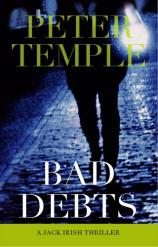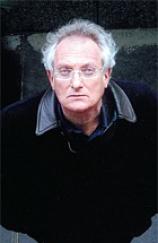Interview: November 25, 2005
November 25, 2005
Bookreporter.com's Suspense/Thriller Author Spotlight Team (Carol Fitzgerald, Joe Hartlaub and Wiley Saichek) interviewed acclaimed Australian novelist Peter Temple about his latest endeavors, BAD DEBTS and BLACK TIDE. Temple cites his interest in the law as the catalyst for this new series, and discusses elements of his own personality that are infused into that of his protagonist, Jack Irish. He also names his major literary influences, shares his initial reason for becoming a writer, and describes what he hopes American readers will learn from his books.
Bookreporter.com: Is there a real-world model for Jack Irish? If so, does he recognize himself? If not, is he a commingling of many different acquaintances?
Peter Temple: Jack Irish is made up of bits of many people. I am not one of them, unfortunately.
BRC: Who, pray tell, is your inspiration for Linda Hillier, Irish's love interest in BAD DEBTS and BLACK TIDE?
PT: I've always had a thing about attractive women journalists. I married one, who then became a lawyer.
BRC: It would seem from both books that attorneys in Australia are a bit more hands-on than they are in the United States, possibly closer to Mike Hammer than Perry Mason. Is this true?
PT: No. Jack Irish keeps his legal work and his other occupations as compartmentalized as possible. There is no doubt, however, that he would be a great disappointment to the Law Institute of Victoria.
BRC: We were interested in Jack Irish's hobby, or therapy, of cabinet building. Is this an interest you share as well? And, if so, how did you become involved in it?
PT: I developed an interest in cabinetmaking when I was teaching something called media studies to people who thought media was another word for television. Cabinetmaking kept me from going completely mad.
BRC: Horseracing is another of Jack's interests. You appear to know a great deal about all aspects of the sport, from the breeding to the jockeys to the races themselves. Is this a passion of yours as well, or how did you research it in order to make it a more credible component of Jack's character?
PT: I have been researching horseracing for a good part of my adult life. I call it researching. Others might call it gambling. For me, the appeal of horseracing lies in its uncertainty, its asymmetry, its beautiful arbitrariness. Rich people spend millions of dollars on perfectly bred yearlings and send them to training establishments that charge more than the Betty Ford Clinic.
Most of these aristocratic animals never win a race. Many never put a hoof on a racetrack. And then some battler spends five hundred bucks on an awkward-looking horse with nothing in its bloodline but small failures, trains it in a tussocky paddock, takes it to a picnic race, it wins by twenty lengths, takes it to a provincial, it streets them.
On a Wednesday, they take it to the city, get up in the dead dark, the horse runs against the princelings. It leaves them for dead. Life will never be quite the same again.
It's hundreds of stories like this that have given the track its special place in the inner life of Australians. They say that something good can happen to anyone, that lives can be changed by hope and perseverance.
And by taking a punt. And by sheer bloody luck.
BRC: One of the ongoing themes of BAD DEBTS is how the sins of the past, whether by act, error or omission, return to adversely affect the present, though redemption is possible, as well. Was there any particular incident in your own life that provided the initial catalyst for BAD DEBTS?
PT: I think everyone has something in their lives that reminds them how long a forward shadow the past can cast. My youthful ambition was to be an historian and I remain fascinated by historical detective work.
BRC: BAD DEBTS dealt with Irish attempting to make right an error he felt he had made in the past. BLACK TIDE also concerns the past, insofar as Irish becomes caught up in the hunt for the son of Des Connors, the final link to Irish's long-absent father. Both books provide hints and pieces of Irish's enigmatic past. Is this a subplot that you will pursue in future Irish novels?
PT: Before I started writing BAD DEBTS, I invented a full history of Jack Irish's family. I have used bits of it, alluded to others, and it continues to influence the way I see Jack and think about him.
BRC: BAD DEBTS is your first crime novel. You have also previously taught journalism and editing. What inspired you to strike off into the field of writing?
PT: I became a writer because it dawned upon me one day that I was suffering from undiagnosed boredom. This was leading me into a range of displacement activities, some utterly pointless, others less than healthy. I found that writing gave me a discipline and a sense of purpose. I have also never been bored by writing.
BRC: Your first two crime novels --- BAD DEBTS and BLACK TIDE --- remind us of the work of two American writers: Raymond Chandler, with respect to the subject matter, and Cormac McCarthy, with regard to your descriptive narrative that probes and explores cultural and geographical nuances. Have they, or any other authors, affected your work? And who do you read for pleasure?
PT: These comparisons flatter me. I love both Chandler and McCarthy. I read the former in my youth and heaven knows what stuck to me. I came to McCarthy too late to benefit from any influence, which is a pity. I think that I have been affected by literally dozens of writers --- everyone from Richmal Crompton and Eric Ambler to Camus, Orwell, Ross Macdonald, Hemingway, Evelyn Waugh, Graham Greene, James Hadley Chase, Charles McCarry, John Coetzee, J.G. Farrell, William Styron, Elmore Leonard and Donald Westlake. And no blame attaches to any of them.
I do a fair amount of book reviewing, so my reading is eclectic, a lot of it nonfiction. History relaxes me most and I am reading Tony Judt's excellent A HISTORY OF EUROPE SINCE 1945.
BRC: On a related note, in BAD DEBTS and BLACK TIDE you occasionally have Jack Irish in his more relaxed moments putting a volume open and sitting to read for a bit. Does Irish's choice of reading materials mirror your own at the time of your writing a particular passage, or do such interludes figure as a way to slowly but surely list your favorite literary works as a courtesy for readers?
PT: The books Jack reads don't exist, but, put together, a coded meaning can be found.
BRC: Your background is in editing, journalism and teaching journalism. What inspired you to create a lead character who is a lawyer? Have you "officially" studied law in addition to journalism?
PT: I've never studied law but I am drawn to the law and I admire the way lawyers think. I read cases for pleasure. There's nothing like a good judgment to make you think.
BRC: You originally are from South Africa. Have you set any of your novels in that country, or considered doing so?
PT: I left South Africa out of profound distaste for the white regime and for a long time I had no wish to be reminded of the place. It has changed, however, and so have I. I set a chapter of IDENTITY THEORY in South Africa and one of the lead characters is South African. Given time, there are certainly plenty of themes I would like to explore in the country's recent history.
BRC: BAD DEBTS and BLACK TIDE are the first of your Jack Irish novels to be published in the United States. What do you hope American readers will take with them after reading your books?
PT: My hope is that American readers will enjoy the Australianness of the novels. (In spite --- or perhaps because --- of my origins, I feel very Australian.) Australia isn't a displaced piece of England. It is a country like no other, and I have tried to capture something of its distinctive language and culture.
BRC: Besides BAD DEBTS and BLACK TIDE, you have written two additional Jack Irish novels and four stand-alone crime novels, including one called IDENTITY THEORY. Will we see any of these additional works here in the States in the near future? And on a related note, what are you are working on now?
PT: IDENTITY THEORY was published in the U.S. last year to the sound of one hand clapping. (I hope readers who enjoy Jack Irish give it a try --- I'm rather fond of it.) My new novel, THE BROKEN SHORE, has been well received in Australia and will come out in the U.S. and Britain next year. I'd like to think that American readers will want to read the other Jack Irish novels and the stand-alones, particularly SHOOTING STAR, the pick of the bunch.
I'm now working on a number of things. Too many things. They include the fifth Jack Irish, a stand-alone post-9/11 thriller, a gentler short book, and a three-part screenplay for BAD DEBTS.




